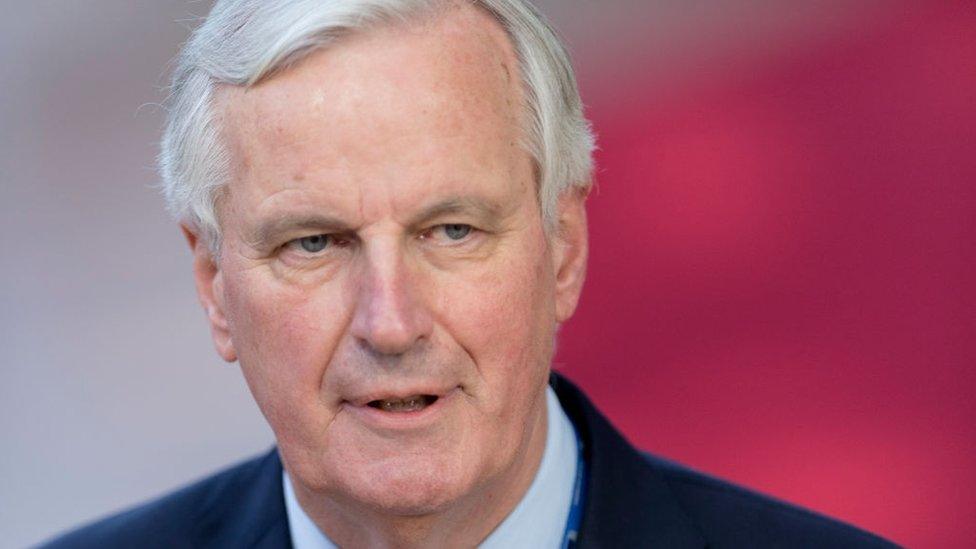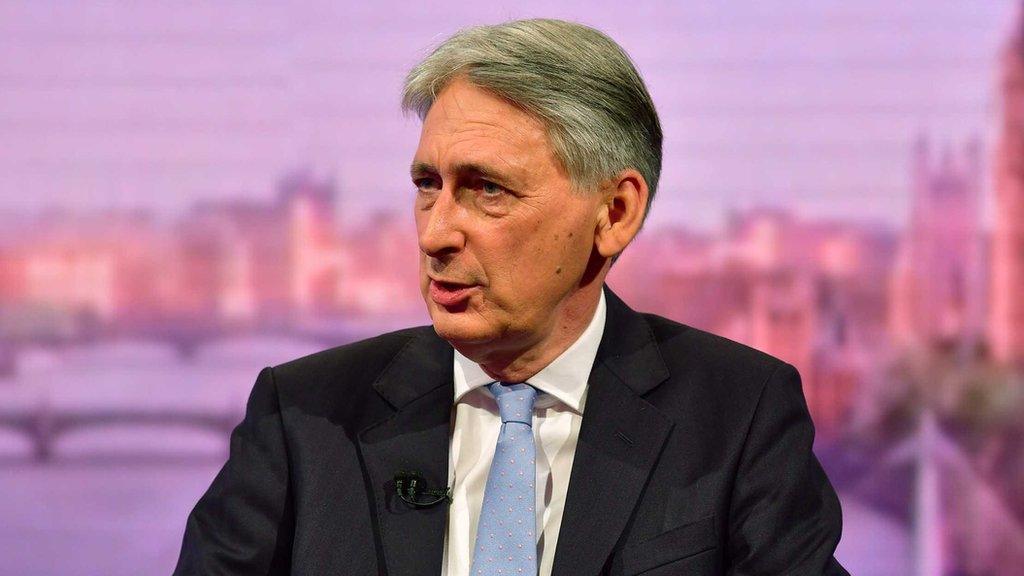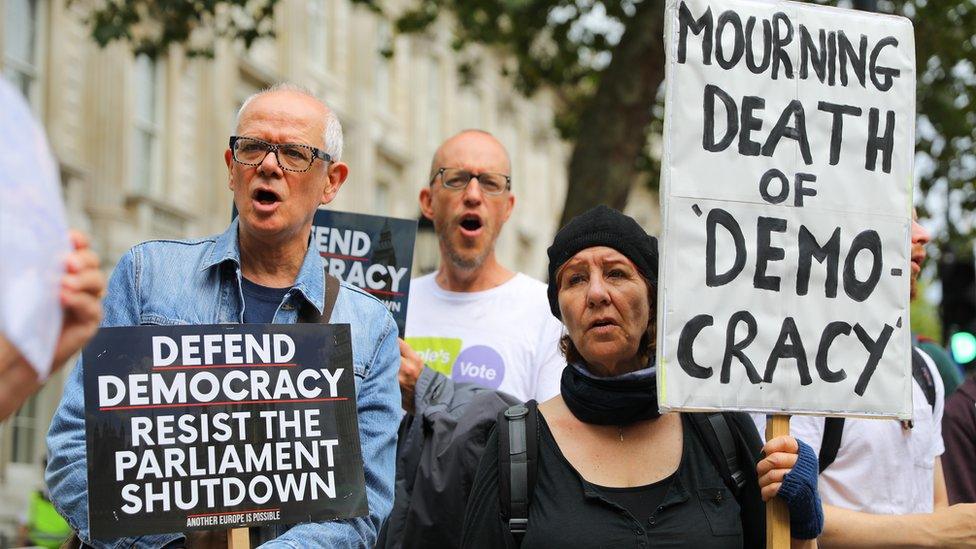Brexit: Michel Barnier rejects demands for backstop to be axed
- Published

Michel Barnier said the backstop offered the "maximum amount of flexibility" that could be given to a non-member state
The EU's lead Brexit negotiator has rejected Boris Johnson's demands for the Irish backstop to be scrapped.
Michel Barnier said the backstop - intended to avoid a hard border on the island of Ireland - was the "maximum flexibility" the EU could offer.
Mr Johnson has previously told the EU the arrangement must be ditched if a no-deal Brexit was to be avoided.
Meanwhile, the PM has told rebel Tories they face a "fundamental choice" of siding with him or Jeremy Corbyn.
His comments come as some MPs who oppose a no-deal Brexit - including Conservatives - are planning to take action in Parliament next week.
The UK is due to leave the EU on 31 October, with or without a deal.
Former justice secretary David Gauke, who voted three times for the Withdrawal Agreement in the House of Commons, will meet the prime minister on Monday to ask about the practicalities of securing a deal.
"I want to hear from him as to what is his plan to deliver a deal, when are we putting forward proposals to deal with this backstop issue - which is the one issue he has identified as the problem within the Withdrawal Agreement," he said during an interview on Sky News' Sophy Ridge show.
"I want to hear how he's going to address that, and I want to hear how he plans to deliver the legislation if we get a deal by 31 October - because at the moment, frankly, I can't see how he's got time to do that."
The backstop is part of the withdrawal agreement negotiated between Brussels and former prime minister Theresa May, which has been rejected by Parliament three times.
If implemented, it would see Northern Ireland staying aligned to some rules of the EU single market, should the UK and the EU not agree a trade deal after Brexit.
Mr Johnson has said there has been some movement from the EU, as he attempts to broker a new deal and remove the arrangement, which he has described as "undemocratic".
However, writing in the Sunday Telegraph,, external Mr Barnier said: "On the EU side, we had intense discussions with EU member states on the need to guarantee the integrity of the EU's single market, while keeping that border fully open.
"In this sense, the backstop is the maximum amount of flexibility that the EU can offer to a non-member state."
Mr Barnier also said he was "not optimistic" about avoiding a no-deal Brexit, but "we should all continue to work with determination".
He added: "The EU is ready to explore all avenues that the UK government may present and that are compatible with the withdrawal agreement."
The EU could not stop the UK from leaving without a deal, he said, but he "would fail to understand the logic of that choice" because "we would still need to solve the same problems after 31 October".
Confused by Brexit jargon? Reality Check unpacks the basics.
Mr Johnson says he wants to leave the EU on 31 October with a deal, but it is "do or die" and he is willing to leave without one rather than miss the deadline.
That position has prompted a number of opposition MPs to come together to try to block a possible no deal.
MPs opposed to a no-deal Brexit are expected to try and seize control of the Parliamentary agenda this week to push through legislation that would force the PM to seek a Brexit extension beyond 31 October.
But Mr Johnson has warned Tory MPs who are considering lining up with opposition groups that they risk plunging the country into chaos.
In an interview with the Sunday Times, he said:, external "I just say to everybody in the country, including everyone in Parliament, the fundamental choice is this: Are you going to side with Jeremy Corbyn and those who want to cancel the referendum?
"Are you going to side with those who want to scrub the democratic verdict of the people - and plunge this country into chaos.
"Or are you going to side with those of us who want to get on, deliver the mandate of the people and focus with absolute, laser-like precision on the domestic agenda?"
His comments come after the Sun reported, external that No 10 would stop any Tory MP who votes to block a no-deal Brexit from standing for the party in a general election.
The report prompted former chancellor Philip Hammond to say it would be "staggeringly hypocritical" for the government to sack Conservative MPs who rebel over its Brexit plans, as eight current cabinet members had themselves defied the party whip this year by voting against Theresa May's Brexit deal.
Speaking on Sky News' Sophy Ridge show, International Development Secretary Alok Sharma said that Mr Johnson must be given time to secure a new deal.
"We want any future agreement not to have the backstop… The reality is that the previous Withdrawal Agreement, which contained the backstop, did not pass on three occasions. It didn't pass then, it won't pass again," he said.
"In fact, having the backstop also potentially makes us rule-takers from the EU forever. That is not what we want. We want that out, we want a deal, but we will be leaving on 31 October - no ifs, no buts."
Shadow chancellor John McDonnell told the same programme that a cross-party group that includes MPs and legal experts is looking at introducing a legislative measure next week to stop a no-deal Brexit without parliamentary approval.
"The technique of that will be published on Tuesday, and I'm hoping that we'll have a debate in which we can bring the House together," he said.
"The ultimate goal, very straightforwardly, this week, is to ensure that Parliament can have a final say... we cannot have a prime minister overriding Parliament - not just on this issue, on any issue."
On Saturday, demonstrations were held across the UK in response to Mr Johnson's plans to suspend Parliament in the run-up to Brexit.
The prime minister, who announced the move on Wednesday, said it would enable the government to bring forwards new legislation.
But the decision prompted an angry backlash from some politicians and opponents of a no-deal Brexit.
Labour leader Jeremy Corbyn accused Mr Johnson of a "smash and grab on our democracy" in order to force through no deal by leaving MPs too little time to pass laws in Parliament aimed at preventing such an outcome.
But Chancellor Sajid Javid defended the decision, adding: "It's right because we are focusing on the people's priorities."
If the prorogation happens as expected, Parliament will be closed for 23 working days.
MPs have to approve recess dates, but they cannot block prorogation.
- Published31 August 2019

- Published31 August 2019

